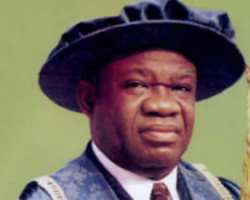Nightmares as power outage worsens – Punch

Many households are in endless nightmares and corporate outfits are grating their teeth as electricity supply ebbs to an embarrassing level. As the development unfolds about two months after the new private investors took over the unbundled firms of Power Holding Company of Nigeria, doubt that the right choices were made ab intio exists in the minds of those who believe in the maxim that morning shows the day. From 4,517 megawatts the country generated in December 2012, the figure at the end of December 2013 was 3,563MW, showing a drop of 954MW. This crash is by no means insignificant; it is indefensible.
The noise and other associated health hazards and financial implications of depending on generators for power supply for 24 hours are unbearable. In Lagos and Kwara states, it has provoked demonstrations by youths whose small-scale businesses have been shut down. Women and youths in Omu-Aran, Kwara State, for instance, had in December carried placards with various inscriptions against the poor services of the Ibadan Electricity Distribution Company. In a similar angry whirl in Lagos, some youths warned, 'No power, no bill.' The issuance of 'crazy' electricity bills at the end of every month without power supply by either the defunct PHCN or its successor companies, has been perennial and unnerving to customers nationwide. This must stop.
The Minister of Power, Chinedu Nebo, at first attempted to rationalise the supply slump by attributing it to recurrent gas pipeline vandalism, reduction of water levels at hydro-electricity power plants, sabotage from disengaged PHCN workers and lack of funds to invest in the power sector by the new owners. But these excuses failed to assuage public anxiety.
As the frustration of the public seems to be bursting at the seams, the Federal Government has crawled out from its defensive shell. At the inauguration of the new board Chairman of the Transmission Company of Nigeria, Ibrahim Waziri, on January 7, Nebo said President Goodluck Jonathan had demanded improved power supply from the Generation and Distribution Companies. He said, 'I wish to charge all the principal sector players …to commit to ensuring that power supply to our customers is significantly and visibly improved by June this year as directed by Mr. President.' Government, he added, 'will no longer tolerate any excuse of non-performance,' and threatened to invoke relevant provisions in the transaction to divest ownership.
This is the global best practice. It should be embraced if the country is to achieve the goal of privatising the power holdings. Improved electricity output is at the nexus of economic transformation; therefore, toying with it means subjecting the economy to the inanities that shackled economic growth over the years. Don't forget that this is a sector into which the government has injected about $16 billion since 1999, according to a House of Representatives probe. The late President, Umaru Yar'Adua, befuddled by apparent lack of result and accountability, at a point, alluded to it.
Unfortunately, the DisCos have shown reasons for Nigerians to suspect their commitment to a radical overhaul of the sector. Not showing interest in the pre-paid metering scheme that began before they stepped in is ominous. This means that the corrupt and exploitative tariff regime of collecting money from customers for services not rendered will endure. Nigerians should rise against this duplicitous business. A media report, which quoted the chairman of NEDC/Kepco Consortium, Kola Adesina, owners of Ikeja DisCo, late last year, hinted at a reassessment of the project. 'As investors, we need to look at where we are going and also consider whether the metering scheme will get us to where we are going. However, if it will not get us to where we are going, we will drop it,' he said. But modern economies do not allow investors in once public corporations, bound by performance contractual obligations, to run riot like a bull in a China shop.
Electricity supply will definitely improve when the investors are subjected to the simple market principle of payment according to services rendered, and invest in infrastructure overhaul in the sector, which they promised to provide and are legally bound to do. Unfortunately, a weak oversight from the Nigerian Electricity Regulatory Commission has emboldened the DisCos to bare-facedly reject even directives from the agency to install prepaid meters acquired by the Federal Government before ownership changed hands.
So many privatised public enterprises have failed because of the inertia in enforcing rules of engagement or compromises by government officials. This should not continue in a critical sector such as power. This is how the market works elsewhere: a Nigerian company, HiTV, had its English Premier League £I00 million broadcast rights in 2009 terminated for not complying with the contractual obligation of paying the balance as and when due. Consequently, it lost its £50 million initial deposit.
We admit that challenges exist in efficient power delivery. The government owes Nigerians a duty to demonstrate the political will to discharge its role. Nebo should not howl at the investors only, he should also be curious why the shortage of gas to power the power plants is an issue in an oil producing country. The government has been shifting the goalpost for ending gas flaring. The oil firms that do so here are bound by law in Europe, America and elsewhere against such environmental breaches. Corruption is at work. A reversal of the gas saga is crucial in getting our power supply geometry right.
According to a report by the Presidential Task Force on Power, South Africa, with a population of 44 million, generates 44,074MW, while Brazil has 100,000MW for its 201 million citizens. Ghana, our close-door neighbour, generates 2,111MW, for just 23 million people.
When these figures are compared to Nigeria's 3,600MW for about 160 million people, then the failure of leadership and corruption in the country appear in bold relief.
